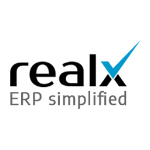TechnologyCounter provides genuine, unbiased real user reviews to help buyers make informed decisions. We may earn a referral fee when you purchase through our links, at no extra cost to you.
List of Best Construction ERP Software
Showing 1 - 7 of 7 productsAstral Real Estate Management System provides end to end solution for Defining Project, Properties, Property booking, Payment Plan, Agreement, Stamp Duty & Registration till final Possession...Read Astral Real Estate Management Reviews
Astral construction site tracking system can help you to track your Inventory lying at your site from head office. Head office can manage different site stock on the Real-time basis...Read Astral Construction Management Reviews
Vyom ERP is a enterprise resource planning software that provides solutions for efficient business management such as finance, human resources, inventories, and more...Read The Vyom ERP Reviews
Realx ERP is a cloud-based program, making it the most cost-effective, hassle-free, and simple-to-use ERP solution available. It has the greatest ability of customization, and has the shortest implementation time and also provide superior customer su...Read Realx ERP Reviews
In4Suite ERP is a cloud-based enterprise resource planning (ERP) solution tailored to the real estate and construction industries. It streamlines company procedures, improves project management, and increases overall operational efficiency...Read In4Suite ERP Reviews
NYGGS Automation Suite is an Construction ERP software company based in Gurugram, Haryana.
NYGGS Automation Suite is the right destination. With a suite of comprehensive modules like Plant & Machinery Management, Fuel Monitoring System, Store & Inventory Management and more, we empower you to take command of every corner of your business...Read NYGGS Construction Reviews
Shadobooks accounting ERP software simplifies accounting, invoicing, inventory and financial management for businesses and accountants...Read Shadobooks ERP Reviews
- What Is Construction ERP Software?
- Top Reasons Why Businesses Need Construction ERP Software?
- What Are the Top Key Features of Construction ERP Software?
- What Are the Top Benefits of Construction ERP Software?
- What Are the Steps to Choose the Right Construction ERP Software?
- What Are the Types of Construction ERP Software for Different Industries?
- What Are the Technology Trends for Best Construction ERP Software?
- What Are the Deployment Options for Construction ERP Software?
What Is Construction ERP Software?
Construction ERP software is a software tool that assists construction managers in efficiently planning, controlling, and executing their projects. Project planning, budgeting, procurement tracking, resource allocation, scheduling, document control, and project tracking are typical features.
Construction ERP Software allows teams to manage their resources and production data more easily and affordably. Construction projects become more organized and effective when they use an efficient best construction ERP software. It improves team collaboration by providing them with the knowledge they need to complete tasks more quickly and efficiently.
Construction ERP software provides improved insight into project and resource information, making it easier to recognize possible issues and take corrective action.
Overall, the best construction ERP systems are a significant resource for both large and small construction firms. It delivers the correct information at the right time to guarantee that projects are completed on schedule, under budget, and to the highest quality and reliability requirements.
Top construction ERP software has transformed the way construction organizations function by improving communication, project planning efficiency, and resource management consistency.
Top Reasons Why Businesses Need Construction ERP Software?
1. Enhanced collaboration between company departments: Construction ERP software integrates structured data, business processes, communication, and collaboration into a single system, allowing multiple departments (such as accounting, operations, and project management) to collaborate more effectively.
2. Improvement in decision-making: Construction ERP solutions provide rapid and precise decision-making by providing a single version of the truth and a better grasp of cost control, margins, client requirements, and equipment availability.
3. Better resource management: Top Construction ERP software improves resource management by tracking project budgets, estimating costs, and maximizing resource utilisation.
4. Quality control: Construction ERP solutions enable firms to track quality feedback and trends, allowing them to swiftly identify and address problems.
5. Automation of non-core processes: Rather than having dedicated workers conduct time-consuming and tiresome duties like manual document preparation and filing, best construction erp software may automate these processes.
6. Acceleration of project lifecycle: ERP solutions provide a real-time perspective of project performance, enabling teams to make more informed decisions and shorten project cycles.
7. Improved risk assessments and planning: A thorough picture of the project, resources, and tasks allows you to recognise hazards and plan accordingly.
8. Improved asset utilization: By tracking productivity and utilisation of equipment, materials, and resources, best construction erp systems provides insight into asset utilisation.
9. Improved customer satisfaction: Companies can obtain visibility into client requirements and respond quickly to any difficulties or complaints, resulting in higher customer satisfaction.
10. Ease of deployment and maintenance: Best construction ERP software frequently has modest hardware and software requirements, making setup simple and quick. Furthermore, system maintenance is typically performed by a single IT support team, who frequently provides support remotely.
11. Improved scalability: Construction ERP software is designed to scale effortlessly with company expansion, saving businesses time and money.
12. Increased profitability: Best construction ERP systems assist businesses in increasing efficiency, streamlining processes, and lowering expenses, resulting in greater profitability.
13. Reduced overhead costs: Top Construction ERP software may dramatically cut overhead costs by automating processes and reducing manual labour.
14. Integrations with third-party tools: Integrations with third-party software such as accounting tools are simple due to the open nature of ERP systems.
15. Improved security: With features such as role-based access and encryption, construction ERP offers safe data storage and access.
What Are the Top Key Features of Construction ERP Software?
1. Project Management: Construction ERP software aids in the management of all aspects of a project, from planning and scheduling to budgeting and cost control. It enables construction teams to measure progress, manage resources, and guarantee that projects are completed on time and under budget.
2. Document Management: Best Construction ERP software has document management features that allow users to store and manage project-related documents. Permits, contracts, task lists, safety records, and drawings may all be managed with the software.
3. Bidding: Construction ERP software streamlines the bidding process by providing tools for preparing, reviewing, and submitting bids. The programme makes it easier to handle and track bids from multiple providers in real time.
4. Inventory Tracking: Best Construction ERP systems aids in inventory management by allowing users to track and monitor materials utilized in projects. It also aids in the optimisation of resource allocation, the maintenance of adequate stock levels, and the management of material costs.
5. Human Resources Management: Top Construction ERP software improves people management by allowing users to handle employee data, attendance, overtime, performance, and payment more effectively.
6. Reporting and Analytics: Best Construction ERP systems enables detailed reporting and analysis, making it easier to discover trends, monitor performance, and control costs.
7. Accounting: Users of best construction ERP software may manage their accounts and maintain track of their finances. It includes functions including invoicing, integrated payments, and accounts receivable.
8. Security and Compliance: Construction ERP software assists in ensuring that the information saved in the system is secure and in accordance with the needed standards. It provides capabilities for safeguarding data against unauthorised access and theft.
What Are the Top Benefits of Construction ERP Software?
1. Streamline workflows and improve efficiency: Construction ERP software can assist in streamlining workflows, saving time, and improving accuracy. It can automate repetitive operations and reduce the need for manual data entry, resulting in increased productivity.
2. Improved communication and collaboration: Top Construction ERP software helps all stakeholders, from subcontractors to project managers, communicate more effectively. This real-time collaboration results in more accurate data and increased transparency.
3. Enhanced project tracking and monitoring: Best construction ERP software improves project visibility by allowing project managers to track and monitor activities in real time. It aids in the prioritisation of activities, dates, and expenses, ensuring that all project parts are completed on schedule and under budget.
4. Cost reduction: Construction ERP systems can cut expenses by reducing the need for manual data entry and providing users with instant access to the right information. Furthermore, by streamlining workflows and automating various procedures, projects can be finished more quickly and efficiently.
5. Improved decision-making: Best Construction ERP software enables users to make better, more informed decisions by delivering real-time data and analysis. It can help to decrease risk and ensure projects are finished on schedule and under budget.
6. Enhanced customer service: By giving access to up-to-date project information, construction ERP systemsmay improve customer service. This can contribute to more accurate billing, faster payment processing, and fewer disputes.
7. Comprehensive reporting: Top Construction ERP software generates detailed data on project management operations such as job costing, budgeting, billing, and invoicing. This improves accountability and ensures that all stakeholders are kept up to date.
What Are the Steps to Choose the Right Construction ERP Software?
1. Assess your current operational processes: Before selecting an ERP software, you should evaluate your current processes and become acquainted with the flow of work from beginning to end. This will assist you in identifying areas for improvement and managing the transition to a new ERP system.
2. Define your requirements: You should explicitly identify your ERP software requirements in terms of features, functionality, and integration capabilities. Take into account the special requirements of your construction company.
3. Research different solutions: After you've determined your needs, it's time to look into other options. Examine various ERP options and read reviews and case studies on each one. This will assist you in making an informed selection.
4. Set a budget: Setting a budget for your best construction ERP software is essential so that you may explore alternatives that fit within your budget.
5. Make a decision: It's time to make a decision when you've completed all of the necessary processes. Select the ERP software that best meets your company's needs and budget.
6. Implement and test: Following your decision, it is time to implement and test the ERP software. Make sure to thoroughly test the system to ensure that it functions as planned.
What Are the Types of Construction ERP Software for Different Industries?
The types of Construction ERP software available vary for different industries. Generally, there are five types of software options:
1. General Contract Management Software: This type of ERP software is intended to manage all parts of general contracting projects, such as project tracking, bidding management, and material and service cost management.
2. Engineering and Architectural Design Software: This ERP software is intended for engineering and architectural projects, and it includes features such as project management, project pricing, engineering plan analysis, and contact management.
3. Estimating and Bidding Software: The best construction ERP systems are intended for precise bidding and estimating on construction projects, as well as tracking operations, controlling employee costs, and tracking bids and paperwork.
4. MEP (Mechanical, Electrical, and Plumbing) Software: The best construction ERP systems is intended to manage all parts of a construction project involving mechanical, electrical, and plumbing subsystems, such as inventory monitoring, cost and material estimation, and subcontractor management.
5. Building Information Modeling (BIM) Software: This ERP software is intended for architects and construction engineers to use to generate virtual models of buildings that integrate both design and construction operations.
What Are the Technology Trends for Best Construction ERP Software?
1. Cloud Computing: Cloud computing is gaining popularity in the construction business because it provides companies with more accessibility, reliability, scalability, and cost-effectiveness. Cloud-based solutions enable users to access and update data from anywhere, while also giving customised and efficient construction tools.
2. Internet of Things (IoT): By connecting systems, devices, and machines to data sources, IoT has the potential to revolutionise the construction management business. It will enable construction managers to simply and remotely monitor various construction sites, enhancing efficiency while decreasing time, cost, and labour.
3. Artificial Intelligence (AI): AI has the ability to completely transform the construction business by allowing construction managers to automate procedures, boost efficiency, and optimise scheduling. AI-powered technologies can detect flaws before they become costly ones, saving construction managers time and resources.
4. BIM (Building Information Modeling): BIM may provide managers with a comprehensive full-scale perspective of a project's lifespan, allowing them to execute projects more quickly and efficiently. It allows managers to see confrontations before building begins, allowing them to detect and eliminate any problems before it is too late.
5. Mobile Solutions: Mobile solutions have grown in popularity in the construction industry because they enable construction managers to view and manage data from anywhere. Mobile solutions improve team communication, resulting in more collaboration and efficiency.
What Are the Deployment Options for Construction ERP Software?
Construction ERP Software deployment choices include on-premise, mobile, cloud-hosted, and hybrid.
1. On-premise means that the ERP software is installed on the company's own hardware and network resources. This is a manual process that necessitates the use of professional IT personnel to manage and maintain the system. It also necessitates an initial investment because monies are required to purchase, install, and maintain the hardware and software.
2. ERP software can be accessed via mobile devices. Because all of the information is available on the device, this type of deployment makes it easier to monitor progress and perform remote and field operations.
3. ERP software that is hosted in the cloud. This eliminates the need for IT personnel to manage the system and lowers the company's initial expenditure by eliminating the need to acquire, install, and maintain hardware and software.
4. ERP software is deployed in a hybrid configuration that combines the first two options: on-premise and mobile. This allows organisations to obtain information from a centralised source and provide greater mobility for field workers.







